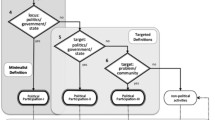Abstract
The everyday virtue of civility functions as a constraint upon informal social pressures. Can civility also be understood, as John Rawls has proposed, as a distinctively political constraint? I contrast Rawls's project of constraining the political with Mill's of constraining both the social and the political, and explore Rawls's account of the relation between the two. I argue that Rawls's political duty of civility rests on the assumption that the political is peculiarly coercive; ignores the social enforcement of morality; and implausibly has civility apply to motives in acting, rather than to actions.




